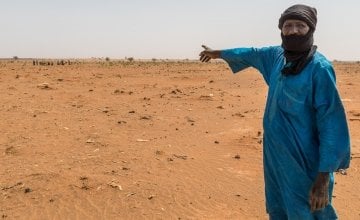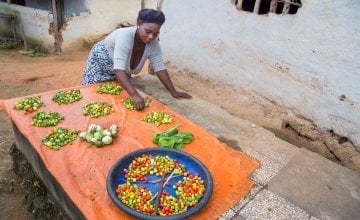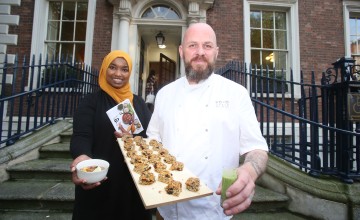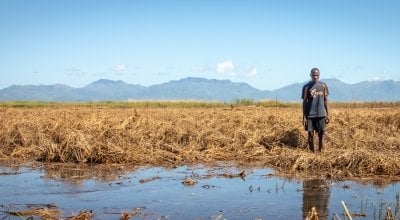
Read our 2024 annual report

Knowledge Hub
It has been widely documented that we need to transform our global food system in the face of a rapidly changing climate and a growing population. It may seem like a mammoth task but small actions can make a big impact. The question is, where do we, as consumers, begin?
The problem
A massive 75% of the global food supply currently comes from just 12 plant and five animal species, limiting the range of nutrients we are all consuming. While many of us may be consuming enough calories, we are not all consuming enough of the vitamins and minerals we need to really thrive.
By limiting our diets, we are also limiting the diversity of plants and animals used in agriculture. This can have a detrimental effect on our ecological systems. Repeated harvesting of single crops can deplete soil nutrients which leaves soil vulnerable to pests and pathogens. Many types of wildlife and plants cannot thrive in degraded landscapes.
Most alarming of all, our current agricultural practices are responsible for approximately one quarter of the greenhouse gas emissions which are contributing to rising temperatures across the globe. The resulting climate crisis is having a direct impact on global rates of hunger. It is reducing crop yields, destroying livelihoods, increasing displacement and conflict and deepening inequalities, all of which can result in already vulnerable communities having less food to eat. There are some 822 million people around the world today who are going hungry. The worst part is, they are the people who are least responsible for causing climate change and the least equipped to deal with its effects.

The solution
Knorr foods have recently provided an in-depth guide to 50 of the world’s most sustainable foods. These are foods that have a lower impact on our planet and which promote increased biodiversity. The great news is, they’re also good for bodies.
The list is broad and spans the globe, picking a selection of foods that fall under 11 broad categories: Algae; Beans and Pulses; Cacti; Cereals and Grains; Fruit vegetables; Leafy greens; Mushrooms; Nuts and Seeds; Root vegetables; Sprouts; and Tubers.
The list spans the globe so some of the foods are lesser known here in Ireland. Although a few are very familiar to us here in Concern.
Sustainable foods we’re helping to grow
The communities we work with are on the front line of the climate crisis. So we’re supporting them to adapt Climate Smart Agriculture practices which adapt their farming systems to become more resilient to a less predictable climate. This includes promoting more diversity in the crops they produce. Amongst them are three foods from the ‘Future 50’ list.
In Liberia, for example, our Farmer Field Schools are helping people to grow Cowpeas and Groundnuts. Both offer a high protein addition to diets which are heavily reliant on the country’s staple crop, cassava. Both are also high in Nitrogen which helps to make the soil more fertile. This in turn boosts yields when alternating with other crops. We’re also encouraging the growth of Moringa, which as well as being highly nutritious is thought to have medicinal purposes. Sales of Moringa crops can also generate income for programme participants.

Sustainable foods grown in Ireland
Happily, there are plenty of foods on the list which are more well-known to us in Ireland. Ireland is rich in sustainable food sources but here we shine a spotlight on some of those foods that feature on the ‘Future 50’ list which are grown here and are readily available for us to buy:
Kale: Falls under the ‘Leafy Green’ category and belongs to the cabbage family. Grown year-round, it is able to withstand temperatures as low as -15 degrees Celsius. It is packed with Vitamins A, K and C as well as being a good source of manganese and copper. It can be eaten raw or it can be roasted, boiled, sautéed or grilled. It’s popular in soups, stews and curries and is also available in powdered form to be added to smoothies.
Spinach: Like Kale, it is a ‘Leafy green’ and is suited to cooler climates so it can be grown all year round. It is high in vitamins A, C , K and folate (B vitamin) and is also a good source of Iron. Popularly used fresh in salads, it can also be steamed sautéed and stir-fried to be added to stews, soups, curries or pasta dishes.
Flax seeds: Falls under the ‘Nuts and Seeds’ category. They are better grown in cooler climates with some sunlight. Also known as linseeds, they contain alpha-linolenic acid which is an Omega 3 fatty acid. They’re commonly sprinkled on salads and cereals but can also be used as a key ingredient in other foods for example, vegetarian burgers or replacing half the flour in baked goods such as bread or muffins. Flax seed oil is also popular in dressings and sauces.
Hemp seeds: Another seed on the list, Hemp is fast-growing and thrives in a variety of soils. These small and crunchy seeds are rich in Omega 3 and Omega 6 fatty acids. They also contain protein, fibre, iron and a variety of other minerals and vitamins. They can be eaten raw, made into hemp meal, or made into powder. They’re available as oil, a milk substitute, flour and are used in many products including soups, sauces, crackers, biscuits and bread.
Tips on eating sustainably in Ireland
Conor Spacey is the Culinary Director with FoodSpace, a contract catering company with the maximum 3 star accolade for sustainability. Conor is a long-term advocate of the responsibilities that chefs have to ensure that they produce food that is sustainable, waste-free and environmentally friendly. He shared some advice with us for anyone in Ireland who is hoping to embark on a journey to more sustainable eating.
Don’t be afraid to try things. Take small steps. Don’t try overnight to change your entire diet. Gradually introduce more vegetables. If you want to cut out meat, maybe reduce your meat intake to one or two days a week and incrementally introduce new greens and plant based foods in to your meals. If you look at what you’re doing and maybe each month pick one thing you’re going to change, over time these little steps will have a bigger impact.

Learn more about hunger, climate and the global food system
The Global Hunger Index is an annual report produced by Concern Worldwide and Welhungerhulfe, to comprehensively measure and track hunger at global, regional, and national levels. This year, it focuses on the link between climate change and hunger and how climate change is affecting the global food system in ways that increase the threats to those who currently already suffer from hunger and undernutrition. Read the report to find out more.





